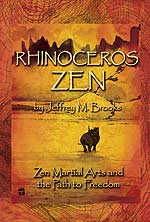Five Dollars

By Jeff Brooks
Editor’s Note: This article is
an excerpt (Chapter 18) from Jeffery Brooks’ new book, “The
Rhinoceros Tale – A Practitioner’s Guide to the Alchemy of
Action,” now available in FightingArts.com’s e-store. The
book is a fresh perspective on karate and Zen which emphasizes the importance
of dedication to practice. Included too are new insights and stories
of Okinawan karate and Zen masters as well as stories - moving, terrifying,
humorous -- about the people who have made practice their own.
In my 20’s karate practice was a welcome respite from turbulent
emotions and thinking. What a relief it was to be able to just shut up
and train. It felt honest. It provided a stark contrast to graduate school
and to ad agency life. Even 7 or 8 years into my training career I was
still unable to invent the life I wanted, or even imagine a way to create
the life I wanted to live.
During those years I practiced karate, furiously. I walked and I explored
the architecture of the public parts of the city. I learned them intimately.
Every block, every store, every lot. I loved to escape the city streets
and walk near the rivers. There you could find open areas where you could
see the sky and the titanic scale of the city itself. I walked under
the vaulting underpasses supporting the roads above and concealing strange
people below. These places became familiar turf to me. Places where I
could breathe fresh air off the river, and have the feeling of being
in an environment not built but Created. I explored it all.
In school and in my office at work I felt constricted by the information
underload of the synthetic physical environment, hemmed in by the buildings
and streets that made that world. I yearned for expanse, for the endlessly
searchable, mysterious, changing environment, the sweet, sensible information
flood of the natural world. Why could I not then imagine my way out to
the world beyond the fabricated environment bounded by advertising, media,
personal ambition, delight and dread, the human urban world whose shape
and sound is a cascade of wanting, wanting, wanting? And then there was
my wanting... but what did I want?
That is why the karate dojo looked like paradise to me. Hope was there.
Everywhere I looked. The dojo was made out of natural things – wood
and plaster and brick – and the imprint of human hands, the traces
of human life, was all over it. The cracks in the plaster and the gaps
between the mismatched boards. The leaks that dripped through the cracks
in the ceiling. The cracks patched and filled in and broken out a hundred
or (who knows) maybe a thousand times over the decades showed signs of
human life that were banished from the antiseptic corporate buildings
where I spent my days.
There in the corporate world, the polished cool marble, the acres of
carpet, the uniform white walls, the flawless drop ceilings, the hush,
the well-hung fine art, felt to me suffocating. There was no way into
it. I felt like a pet. Praise or penalty within prescribed parameters.
My volition irrelevant. My boundaries narrowly defined. I had something
valuable to sell (I was clever with words), but I wasn’t
really on the team. I was half on the team. The job seemed convenient.
In the dojo I was free to feel and to move and to be fully alive with
all my senses engaged. My choices open, my relationships fresh, my body
and mind working together, doing what they were made to do, and heading,
with every gesture, every thought, every new technique, every drop of
sweat, every silent pause, toward perfection. Nothing wasted. No one
deceived.
And there was a room full of people who shared it all. I did not know
most of them well. But there we were showing up at the same time, day
after day, week after week, doing the same moves, shouting as loud as
we could, smashing our fists into the thin air again and again till,
as the months went by, we could hear the thick cotton sleeves of our
jackets snap with every punch, we could hear the walls reverberate and
the floor yielding with a satisfying shudder every time we slammed our
feet into the well worn wooden boards.
The old guys drinking in the bar downstairs, and the tenants packed
around us in the apartments upstairs and the buildings next door, just
had to shake their heads and shrug, or turn up the TV, and, amid the
dinner hour din we produced, say to one another or to themselves, Hey,
what’re ya gonna do?
I was alive. I felt like one of the trees that sprouts between the cracks
of the sidewalk in abandoned parts of town, that grows up and splits
the pavement all the way across and then, with good luck, can just grow
up and push the concrete aside and have a life, even there. That’s
what I felt like. Too melodramatic? I think so too, looking back, but
there are times when you need a stark contrast. Like flint and steel.
Like lightning. Like true love.
And as I pressed with all my effort toward the point of liberation,
breaking away from the world of art and artifice with all its feelings,
comforts, posturing, desire, yearning and sensitivity, the need and the
fear and the talking, the ever-present promise of gratification lurking
always just beyond the horizon of our imagination, I wanted out. I was
trying to break out, to break through to something alive and better and
true. But with all that single-mindedness I lost sight of my objective
(a free and honest life) and focused only the method: I became narrow
and hardheaded.
Two guys came up to me on a busy corner, and pressed against me on both
sides. They appeared from the midst of the crowd while we were all waiting
for the light to change. One of these two tall guys, faces so close to
mine I could smell them, spoke.
It should have set off an alarm in my mind when, seconds before, I walked
past a guy lying on the sidewalk, bleeding and groaning a little bit.
Now it might seem unbelievable that I thought little of it. But this
was not unusual for that place and time. The sight of people laying down
on the sidewalk, especially in the warm weather, was common. There were
people lying on the pavement, on metal ventilation grates, at the side
doors of office buildings, or in the little square patches of dirt cut
out from the cement sidewalk around the trees, with a bag of belongings
or a shopping cart full of cans by their side. The homeless were everywhere,
all over town.
So here was another one, nothing special, he blended in. But this particular
guy on the ground was bleeding. And he was not dressed in rags. The signs
were not subtle. But they were still too subtle for me. Because I was
so used to being single-minded and determined I overdid it this time:
I just kept going.
When I got to the corner these two big guys came up to me, one on each
side. And one pushed into me to get my attention. When I looked over
he slipped a screwdriver from his coat pocket, just enough to let me
see what was what. The handle was thick, red plastic. The tip was filed
to a point. And then the other fellow pressed into me. I could smell
the sweat and onions on him and he said “We want five dollars.”
They knew, for sure, they could stick that screwdriver into me in an
instant and be gone. I knew it too. They knew that I would probably just
fall on the ground and moan and bleed like that other guy, and everyone
else on the corner would walk on by, relieved they’d dodged this
bullet, because we had a habit of being fatalistic about the dangers
of our city and we told ourselves you never know when your number’s
up, and that’s just the way it goes.
But I just stood there. I did not worry. I did not flinch. I did not
care. This was a moment in which my dumbth paid off. I do not recommend
this approach. I recommend giving the money. But I was too short tempered
to do that myself so I put my life on the line for the five bucks.
They said “We want five dollars,” and I said: “Fuck
you you’re not getting it.” I took one step back and felt
sure I could smash one of these guys before the other one killed me and
I think the guys thought the same thing, or maybe they just figured who
needs this headache, because there are other people in this crowd who
will just go along with the program. Whatever the reason, they just drifted
away into the crowd and they were gone and I went on, and I noticed as
I crossed 14th Street that my heartbeat was steady as a rock.
About The Author:
Jeffrey M. Brooks holds a Go Dan Fifth Degree Black Belt
in Matsubayashi Shorin Ryu, training in Okinawa, Japan and the USA with
Shoshin Nagamine,
the founder of the style, Takayoshi Nagamine, his successor, as well
as numerous others in the Matsubayashi Ryu lineage and related Chinese
traditions. His Buddhist study and practice is with Rev. Issho Fujita,
resident director of Valley Zendo and Geshe Michael Roach of the Asian
Classics Institute. He has an M.F.A. from NYU Film School and works as
a speechwriter for public figures. He is founder and director of Northampton
Karate and Northampton Zendo in Northampton, Massachusetts, offering
classes daily for adults and children since 1988. Brooks’ column, “Zen
Mirror”, and other articles regularly appear on FightingArts.com.
New!
FightingArts.com is pleased to announce its first
book: “Rhinoceros Zen –Zen
Martial Arts and the Path to Freedom,” by Jeffrey Brooks, a work
that portrays the dual paths and interplay between Zen and Karate-do.
Fast paced
and easy to read, it is full of insight and wisdom. It is a rewarding
read for any martial artist.

(Softcover, 300 pages, illustrated)
FAS-B-001

|
|